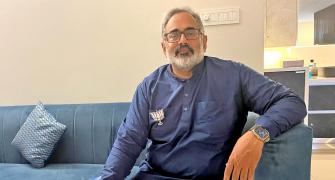"Thus, sleep appears to fulfill some fundamental function, but what this function is still remains unknown," says Dr Joshi John, neurophysiologist at the department of psychiatry at UCLA School of Medicine.
Dr John's researches into sleep, which won him two awards recently, revealed a few interesting facts. For years, scientists believed that sleep and arousal were regulated by neurotransmitters such as serotonin, norerpinephrine and histamine.
The prevalent belief was that these components are equally responsible for regulating sleep and wakefulness, which led to the conclusion that the chemical level of these components was high during wakefulness and low during sleep.
Dr John and his colleagues at UCLA and VA Hospital-Sepulveda have, at the end of a five year study the results of which were recently published in Neuron journal, presented evidence that wakefulness is maintained solely by the activity of neurons containing histamine.
During sleep, the metabolism slows, consciousness is reduced and during the rapid eye movement (REM) stage of sleep, one loses muscle tone -- happily rendering us unable to act out our dreams, he explains. The brain works almost similarly during a 'dreaming sleep' and wakefulness. But there is a profound difference in both level of consciousness and muscle tone.
The team experimented on brain cells of Doberman dogs with a genetic form of sleep disorder, narcolepsy (a disorder characterised by sudden and uncontrollable, though often brief, attacks of deep sleep, sometimes accompanied by paralysis and hallucinations), which is also seen in human beings.
A strong emotion, or even a joke, can cause sufferers to drop into a state of paralysed awareness ranging from a few seconds to half an hour. This advanced state is called cataplexy; it mimics the physical aspects of sleep, without the mental aspect.
Researchers measured the activity of the brain cells that produce the three components, histamine, norepinephrine, and serotonin, during the fully
When the dogs were awake, the cells that produce the three components were all active, the team found. During sleep, the activity of the cells was greatly reduced. But during cataplexy, when the dogs were alert but had no muscle tone, the histamine producing cells remained fully active, while the other two had little or no activity.
"It shows that histamine is a key chemical in arousal and the maintenance of waking," Dr John explained. The researchers later administered drugs that increase cataplexy, and found no effect on histamine neurons while the other two components were affected.
Histamine is best known as the chemical culprit responsible for watery eyes and a runny nose in allergy attacks. "Given its newly found role in keeping people awake, it is not surprising that antihistamines administered to stop allergy attacks by interfering with the action of histamine cause drowsiness," Dr John noted. These studies on the chemicals of sleep and wakefulness are providing greater insights into the dynamics of sleep, and may have implications on the treatment of sleep disorders.
Currently, 70 million Americans suffer from various sleep-related problems, including 200,000 who are narcoleptic patients. The findings could lead to new treatments for sleep disorders, and drugs that enhance wakefulness. They might also shed light on the familiar sleep-inducing effects of cold and allergy medications that contain antihistamines. Insomniacs, chronically prone to sleepless nights are probably suffering from the reverse -- an excess of histamine.
Dr John's findings have made it not just to scientific journals, but even to mainstream publications such as The New York Times. He was recently named for the Sleep Science Award by the American Academy of Neurology, a professional association of 18,000 neurologists that was established in 1948.
Meanwhile, the Sleep Research Society, founded in 1961, presented him with the Yong Investigator Award. Dr John has been invited to present his research findings at seven international meetings, which is a record in the field. He has also won fellowships from several countries. He currently lives in Los Angeles with wife Asha and daughters Ashley and Jeslin.








